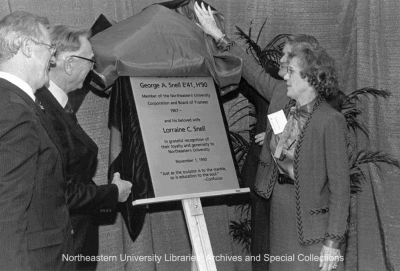First, I’d like to introduce myself. My name is Amira Aaron and I am the new Associate Dean of the Northeastern University Libraries for Scholarly Resources (books, journals, and Library information in all formats).
Today I’m very pleased to announce the availability of the 2010 full collection of eBooks from Springer Publishing, one of the top international publishers of scientific, technical, and medical titles. Our set also includes 2005–2009 volumes from the Computer Collection, including the prestigious Lecture Notes in Computer Science series. Over 4,000 new eBooks are added to the Springer collections each year. The eBooks can be downloaded by chapter and are fully searchable, even on the book chapter level, and they can be printed out and bookmarked online.
The Springer eBooks primarily cover the disciplines of science, engineering, and medicine, but there are also titles in business & economics, humanities, social sciences, law, and mathematics. Individual titles can be found in NuCat.
There’s one additional feature of the Springer eBook collection that I wanted to mention. The “MyCopy (Buy a Print Copy)” service allows you to easily order your own personal soft cover edition of Springer eBooks purchased by the Library (back to 2005); they will be immediately printed on demand and shipped to you within a few days. Note that sometimes the “Buy a Print Copy” link doesn’t appear right away for the newest eBooks.
So why eBooks? Many of you are no doubt avid consumers of eBooks for your personal reading. Academic libraries are also undergoing a huge transformation to eBooks in many disciplines. We are now able to offer 24/7 access to these books from multiple locations for multiple users. With growing numbers of distance education and online classes, many students no longer come to campus on a regular basis, so electronic books and journals are critical to support teaching and research. Searching across the content of many of these eBook collections is powerful and will help you to discover hidden information on a particular topic. In the Library, we also need to deal with space limitations for print materials and an increased need for study space. Finally, we don’t have to deal with lost or damaged books and you don’t have to worry about fines for late returns.
Don’t forget to search the Internet Archive and Google Books for the full text of older books online. In the Internet Archive you’ll find over 1100 pre-1923 Northeastern books that we’ve digitized through the Boston Library Consortium.
We hope you enjoy exploring the new Springer collection and we’d love to hear from you about your use of eBooks offered by the libraries. Join us for a Faculty workshop on using Springer eBooks this Friday, October 29th, from 10-11 in Room 90, Snell Library.
If you have questions, please feel free to contact me at a.aaron@neu.edu or 617-373-4961.
For more information visit our Press Release




